Women & Children
Plan International Ghana Celebrates Milestone in Women’s Empowerment
Published
10 months agoon
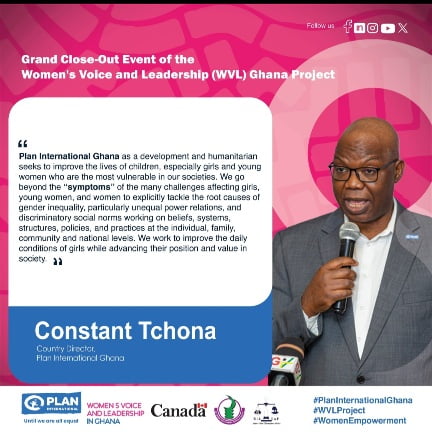
Plan International Ghana held a significant close-out event for the Women’s Voice and Leadership (WVL) Ghana project, celebrating five years of impactful work in localization and the empowerment of women and girls. The event, attended by representatives from the Ministry of Gender, Global Affairs Canada, strategic partners NETRIGHT and WiLDAF, and various Women’s Rights Organizations (WROs), highlighted the project’s achievements and future aspirations.
Mr. Constant Tchona, Country Director of Plan International Ghana, underscored the transformative nature of the WVL project, emphasizing its roots in African Feminist principles. He stated that the project had cultivated a culture of co-creation, flexibility, and transparency in delivering gender-transformative programs. This approach has significantly empowered women and girls, breaking cycles of poverty and building a more resilient, peaceful, inclusive, and prosperous society.
The introduction of Canada’s Feminist International Assistance Policy in 2017 paved the way for the WVL program, which launched in Ghana in 2019. Since then, the gender landscape in Ghana has improved markedly, with increased investment from development partners in WROs. These organizations have played a crucial role in advocating for women’s empowerment, justice, and equality.
Despite their significant contributions, WROs face challenges such as inadequate capacity in governance, human resource management, and external donor engagement, compounded by a dwindling funding landscape. To address these issues, the WVL project allocated over 65% of its budget directly to support WROs through grant funding and capacity building.
Mr. Tchona highlighted the project’s success in enhancing women’s self-esteem, confidence, and leadership abilities. The WVL project has strengthened the agency of women and girls across four key domains: access and control over productive resources, participation and decision-making, social norms, and engaging moral and primary duty bearers and institutions. Through these efforts, the project has challenged social and gender norms, working towards a more inclusive and equitable future.
The event celebrated the contributions of 81 WROs that partnered with the WVL project, enhancing their organizational effectiveness and delivering quality services to women and girls in their communities. Mr. Tchona commended the resilience and potential of these organizations in driving positive change and breaking barriers in peace and security.
In his closing remarks, Mr. Tchona emphasized the importance of continuing to build a pipeline of strong female leaders. He cited the recent Young Female Leaders Conference in Tamale, which hosted over 90 girls and young women from seven regions, as an example of efforts to ensure a vibrant future for the Women’s Rights Movement in Ghana.
Mr. Tchona concluded by affirming Plan International Ghana’s commitment to improving the lives of children, especially girls and young women, by addressing the root causes of gender inequality. He called for collective efforts to redefine leadership, amplify women’s voices, and create a future where gender equality is a lived reality.
You may like


60 beekeepers trained in Volta, Oti regions


Dagbon bows in majesty to bid farewell to Late Mion Lana


GTA official honoured for outstanding support to TOUGHA


Naomi Ohene Oti makes Ghana proud …wins $250,000 Global Nursing Award in Dubai
Plan child birth to protect mother, child-UNFPA country rep


Address systematic issues surrounding juvenile correction — Child Rights Advocate
1 Comment
Leave a Reply
Cancel reply
Leave a Reply
Women & Children
Beyond the cross: The role of women in Easter story
Published
1 month agoon
April 19, 2025
Easter is here again and Christians all over the world are observing the death and resurrection of Jesus Christ, as described in the New Testament.
It also marks the end of the Lent season and is also a time of joy and celebration for many Christians worldwide.
It is therefore not surprising to see Christians organise conventions, crusades and picnics to commemorate the special occasion.
On Good Friday which is expected to be commemorated tomorrow, a section of Christians would wear black to signify the crucifixion of Jesus Christ.
Predictably, it would be all white on Sunday which is the resurrection to signify victory over death.
In this article, The Spectator would look at the role women played in the entire story about the death, burial and resurrection of Jesus Christ.
During the ministry of Jesus Christ, women such as Mary Magdalene, Mary, Martha, Joanna and Sussana played significant roles. They were devoted followers, witnesses, and provided financial support to Him, during his ministry.
At the cross, several women were present during Jesus’ crucifixion, including Mary Magdalene, Mary the mother of James, Salome, and Mary, the mother of Jesus.
Matthew 27:56 mentions that “many women were there beholding afar off, which followed Jesus from Galilee, ministering unto him.” Luke 23:27-31 and Mark 15:40-41 also refer to ‘many other women’ being present.
Women played significant roles in the events surrounding Jesus’ death, burial, and resurrection.
In ancient Jewish culture, women’s testimony was often viewed with skepticism or dismissed altogether. A Jewish historian Josephus noted that women’s testimony was not admissible due to perceived flaws in their character.
This societal bias is evident in the Gospel accounts, where women’s roles as witnesses to the resurrection of Jesus were crucial, yet potentially problematic given the cultural context.
The resurrection account is built on the testimony of women and it best explains the central role of women in the Easter story.
In each of the four gospels of the Bible, (Matthew, Mark, Luke and, John), the women- Mary, Mary Magdalene, were the first to see the risen Jesus. It is their testimony that sends Peter and John to the empty tomb.
The role of women in the death and resurrection of Jesus Christ cannot be downplayed, bringing to light how women can be agents of change and transformation in the face of adversity.
Again, the role of these women in the events surrounding the suffering, death and resurrection is a reminder of the contributions that women can make to the life of the church and recognise the important roles women play in various aspects of life including politics, education and business.
The role of women

In Mark 14: 1-9, it was a woman who anointed the head of Jesus in preparation for his burial. In Matthew 27: 19, a woman urged her husband (Pontius Pilate) to stand against the power of the mob and spare an innocent man’s life.
Again, women were the ones that stood at the foot of the cross as Jesus breathed his last in Matthew 28:1, Mark 16:1-6 and Luke 23:55-56 where women were the first to arrive at the tomb to anoint the body of Jesus.
Also they were the first to be entrusted with taking the good news of Christ’s resurrection to the disciples and were the first to witness the resurrection as captured in Matt 28: 18 -20.
Significance
According to Christianity.com, the role of these women speaks volumes of how much God loved, trusted and rewarded the women. It also speaks to the many ways God is willing, eager and able to use both men and women to advance his Kingdom.
In April 2023, a research paper on ‘The role of women in the events surrounding the suffering, death, and resurrection of Jesus Christ,’ states that women can be agents of change in a society that oppresses and marginalises them.
It said the fact that women played a key role in the events surrounding the suffering, death, and resurrection of Jesus was an example of how they can effect change and transformation.
“The role of women in the events surrounding the suffering, death, and resurrection of Jesus Christ can have significant implications for national development.
One way in which this can be done is by recognisng and valuing the contributions that women make to society,” it said.
The paper said just as Jesus valued and respected women in his ministry, it is important for society to recognise the important role that women play in all areas of life, including politics, business, and education, adding that this can be achieved through policies that promote gender equality, equal opportunities, and the protection of women’s rights.
Just as the women in the Gospels were leaders and co-workers in the early Christian community, women today have the potential to be leaders in their communities, contributing to the growth and development of their nations.
Providing education and training opportunities for women can help them develop their skills and abilities, and empower them to take on leadership roles in society.
It added that the role of women in the events surrounding the Easter story provides important lessons that can be applied to national development by recognising and valuing the contributions of women, promoting their education and empowerment, and encouraging their participation in all areas of life.
Society can work towards promoting gender equality and uplifting women in all areas of society. This is a powerful reminder that God can use even the most marginalised and overlooked members of society to bring about his purposes.
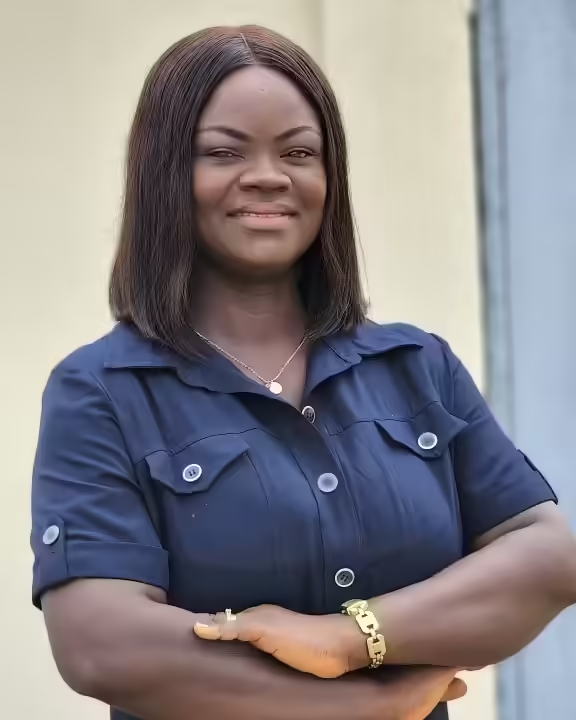
A Women’s advocate, Ms Agnes Opoku Sarpong, has called on young people, especially women, to explore and develop their talents as a pathway to personal growth and empowerment.
Harness your talents, pursue education, and uphold moral values as integral steps towards personal empowerment and societal advancement,” she said.
She said this during a ‘Ladies Night show’ o
rganised by the Fritz Ramseyer Memorial Congregation Young People’s Guild (YPG) of the Presbyterian Church of Ghana in Accra.
Ms Sarpong also a Journalist, speaking on the theme “Empowering Women, Enriching Lives” said empowering women extends beyond individual benefit, contributing to a more equitable and prosperous society.
Quoting Proverbs 31:25, she drew attention to the scripture’s depiction of a woman clothed with strength and dignity, capable of facing the future with confidence and wisdom.
She stressed that when women are empowered through education, economic resources, and leadership roles, they did not only enhance their own well-being but also strengthen their families and communities.
Ms Sarpong underscored the significant responsibility placed on women, particularly as primary caregivers and educators within families.
She highlighted the critical role of education in enabling women to impart essential knowledge and values to their children, thereby shaping future generations positively.
She urged the youth to reject social vices that could hinder their success, “I would encourage you to prioritise education and vocational training to acquire necessary skills and knowledge relevant to societal needs”.
She called on the government, organisations and individuals to create a conducive environment that supports women’s empowerment, enabling them to fulfil their potential and contribute meaningfully to society.
Reflecting on spiritual principles, Ms Sarpong stressed on the importance of utilising one’s gifts to serve others and glorify God.
She urged women to uphold moral values, cautioning against behaviours such as premarital sex that could derail their aspirations and lead to unintended consequences like teenage pregnancy.
She reiterated that empowerment, particularly for women, involves recognising one’s calling and aligning life with godly attributes.
She encouraged all of them to embrace their identity in Christ and strive for personal excellence in every endeavour.

60 beekeepers trained in Volta, Oti regions

Dagbon bows in majesty to bid farewell to Late Mion Lana

GTA official honoured for outstanding support to TOUGHA
Trending

 Politics9 months ago
Politics9 months agoVoter Register Discrepancies: NDC to stage nationwide protests against EC

 News10 months ago
News10 months agoArise Royals Montessori School Marks 2nd Graduation.

 News6 months ago
News6 months agoKing of Igbo Community in Ghana congratulates Mahama as President-elect of Ghana.

 Entertainment11 months ago
Entertainment11 months agoGhanaian musician Champions Gaza Peace with New Track

 More10 months ago
More10 months agoYoung people urged to develop their talents

 News11 months ago
News11 months agoCancer Support Network Foundation holds gala

 Entertainment11 months ago
Entertainment11 months agoSteps to receive an official GWR certificate – Details from mother of a Ghanaian record holder

 News11 months ago
News11 months agoEC Agrees To NUGS Proposal….Sets Up Voter Transfer Centers On Campuses.













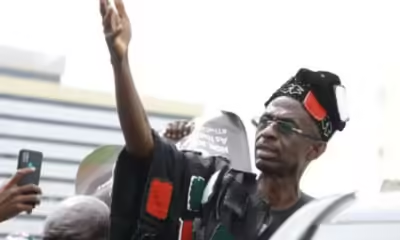
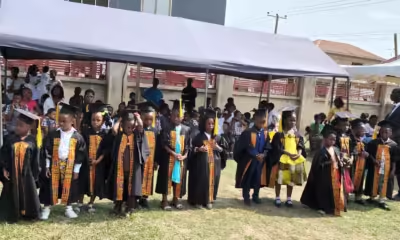
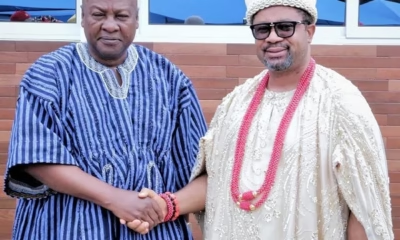
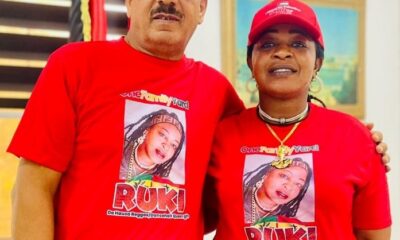


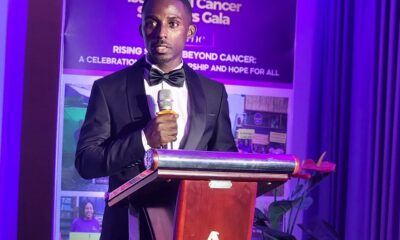

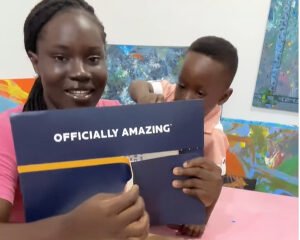



ph987login
May 31, 2025 at 11:23 am
Great insights on baccarat strategies! It’s always refreshing to see content that balances depth with practical tips. For those looking to test their skills in a live setting, the PH987 slot offers an exciting blend of gameplay and rewards.